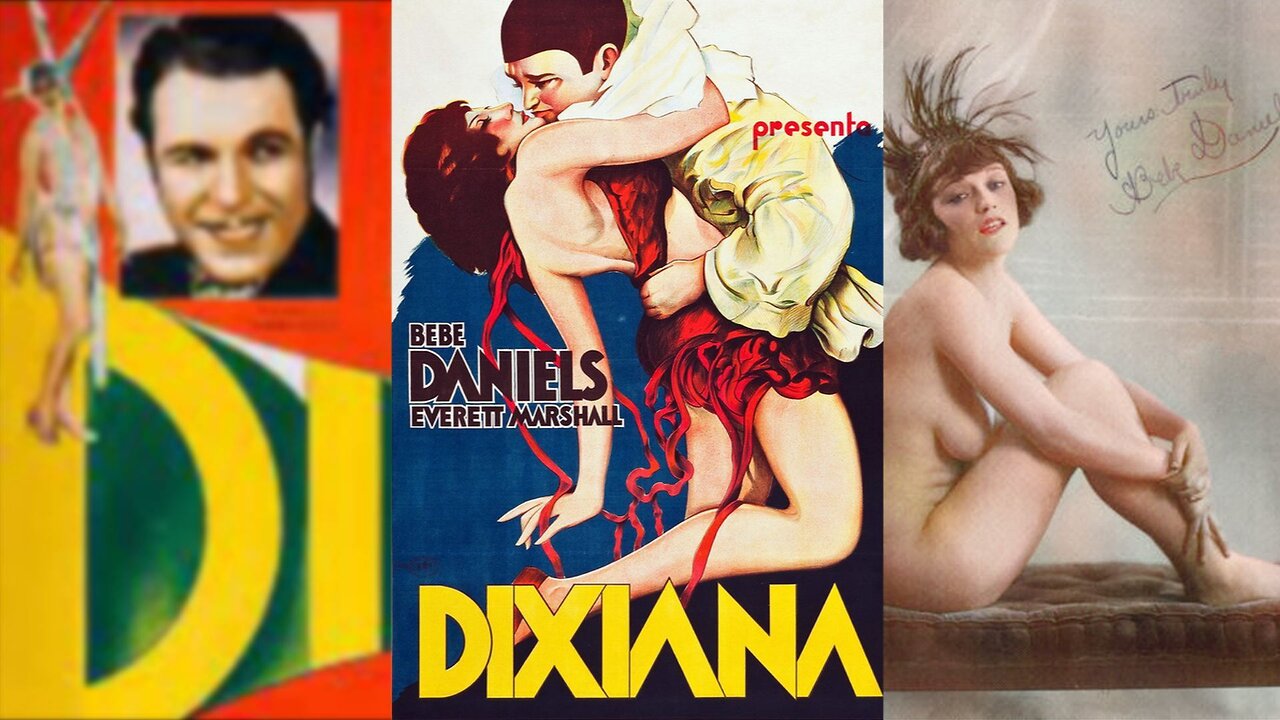Premium Only Content

DIXIANA (1930) Bebe Daniels & Everett Marshall | Comedy, Drama | B&W & TECHNICOLOR
Dixiana (1930) is a lavish American pre-Code comedy, musical film directed by Luther Reed and produced and distributed by RKO Radio Pictures. The final twenty minutes of the picture were photographed in Technicolor. The film stars Bebe Daniels, Everett Marshall, Bert Wheeler, Robert Woolsey, Joseph Cawthorn, Jobyna Howland, Ralf Harolde, Bill "Bojangles" Robinson (in his film debut) and Dorothy Lee. The script was adapted by Luther Reed from a story by Anne Caldwell.
This is the film in which composer Max Steiner received his first screen credit for orchestration. Additionally, it was Wheeler & Woolsey's third film; however, as they were not yet an official "team", they were still billed separately.
SYNOPSIS
In antebellum New Orleans, two men vie for the affections of a beautiful young girl during Mardi Gras.
Dixiana Caldwell and her friends, Peewee and Ginger, are circus performers in the antebellum Southern United States. When Dixiana falls in love with a young Southern aristocrat, Carl Van Horn, she leaves the circus where she is employed and, with Peewee and Ginger, accompanies Carl to his family's plantation in order to meet Van Horn's family. At first thrilled with the news of their impending nuptials, Carl's father and stepmother, Cornelius and Birdie Van Horn, throw a lavish party for the couple. However, Peewee and Ginger inadvertently disclose Dixiana's background as a circus performer, creating a scandal for the elder Van Horns.
Asked by the stepmother to leave in disgrace, Dixiana and her friends return to New Orleans, seeking to gain re-employment from her former employer at the Cayetano Circus Theatre, but they are regretfully refused by him because of the way she had departed. Desperate, she takes employment at a local gambling hall, run by Royal Montague, who also has personal designs on Dixiana. As part of his plan, he intends to financially ruin Carl and his family and use Dixiana to accomplish that purpose.
Things come to a head when Dixiana is crowned queen of the Mardi Gras. When Montague absconds with her, Carl challenges him to a duel, but, when a disguised Dixiana shows up in his stead, she tricks Montague into revealing his nefarious plans. Carl and Dixiana are reunited.
CAST & CREW
Bebe Daniels as Dixiana Caldwell
Everett Marshall as Carl Van Horn
Bert Wheeler as Peewee
Robert Woolsey as Ginger Dandy
Joseph Cawthorn as Cornelius Van Horn
Jobyna Howland as Birdie Van Horn
Dorothy Lee as Poppy
Ralf Harolde as Royal Montague
Edward Chandler as Blondell
George Herman as Contortionist
Raymond Maurel as Cayetano
Bruce Covington as Company porter
Bill Robinson as 'Bojangles' - Tap Dancer
Eugene Jackson as Cupid
Directed by Luther Reed
Written by Anne Caldwell (story), Luther Reed (script)
Cinematography J. Roy Hunt
Music by Harry Tierney (composer), Victor Baravalle (direction), Max Steiner (orchestration)
Production company RKO Radio Pictures
Distributed by RKO Radio Pictures
Release date August 1, 1930
Running time 100 minutes
Country United States
Language English
Budget $747,000
Box office $780,000
NOTES
At the end of 1958, the film entered the public domain in the United States because RKO did not renew its copyright registration in the 28th year after publication.
The Technicolor sequences were considered lost for years but were re-discovered in 1988 and subsequently included in the restored DVD.
Reviewer Mordaunt Hall of The New York Times wrote of the singing, "...one wishes there was more of it and less of the somewhat futile attempt at a story" and noted that Bill Robinson "...gives an excellent exhibition of tap dancing, which won a genuine round of applause" and concluded, "The early glimpses of the circus theatre ... lead one to expect more than one is apt to get out of this production."[5]
The film reunited the director and most of the cast of RKO's most successful film of the year before, Rio Rita, but lackluster performances and direction, as well as a glut of movie musicals led to the film being one of RKO's biggest disappointments of 1930. The film lost an estimated $300,000.
-
 1:04:38
1:04:38
Lost n Found Films
9 days agoADVENTURE IN IRAQ (1943)John Loder, Ruth Ford & Warren Douglas | Adventure| B&W | Vintage Cinema
862 -
 2:13:05
2:13:05
The Nerd Realm
14 hours ago $5.58 earnedNew Years Eve! Fortnite Hunters w/ YOU! Creator Code: NERDREALM
63.6K4 -
 11:04:44
11:04:44
FusedAegisTV
1 day agoNYE Eve! - 2025 Incoming 🎉 - 12hr Variety Stream!
129K7 -
 1:18:52
1:18:52
Awaken With JP
16 hours agoSomehow The World DIDN’T End This Year! - LIES Ep 72
164K88 -
 1:19:34
1:19:34
Michael Franzese
15 hours agoWhat 2024 Taught Us About the Future?
131K32 -
 1:48:09
1:48:09
The Quartering
15 hours agoBird Flu PANIC, Sam Hyde DESTROYS Elon Musk & Patrick Bet David & Woke Witcher?
137K78 -
 4:47
4:47
SLS - Street League Skateboarding
3 days agoLiz Akama’s 2nd Place Finish at SLS Tokyo 2024 | Best Tricks
60.5K6 -
 4:06:54
4:06:54
LumpyPotatoX2
14 hours agoHappy New Year Rumble ! - #RumbleGaming
43.9K -
 10:37
10:37
One Bite Pizza Reviews
1 day agoBest of Barstool Pizza Reviews 2024
69K32 -
 2:37
2:37
Tate Speech by Andrew Tate
16 hours ago2025 WILL BE YOUR YEAR
118K44